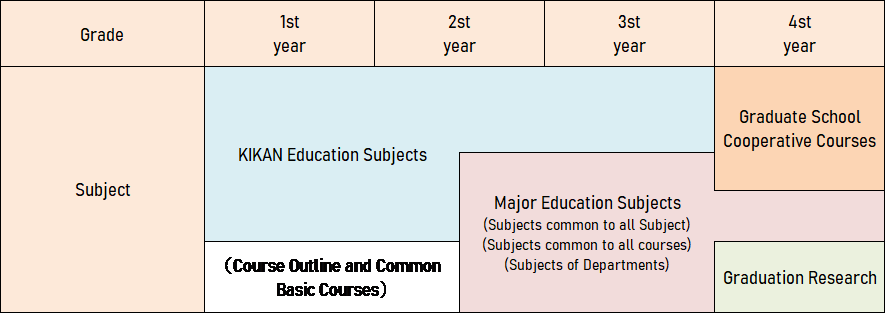Curriculum
General Course(Degree courses in Japanese)
Agricultural science is the science of biological production and utilization, spanning a wide range of disciplines including life sciences, environmental chemistry, marine sciences, and management sciences. It is an applied science that covers agriculture in the broadest sense, including agriculture, forestry, fisheries, livestock, and related secondary processing. Therefore, the research and education at the Faculty of Agriculture is a kind of mini comprehensive university. However, it is a general university with "agriculture in the broadest sense" as its common theme.
Students are not admitted by course or field of specialization but are admitted to the Faculty of Agriculture as a whole and are assigned to their respective courses at the beginning of the second semester of their second year, one and a half years after their enrollment. During the first year and a half after admission, new students to the Faculty of Agriculture are required to take "KIKAN education" and "lower division education courses" to absorb the basic knowledge and concepts of agriculture as an advanced science. They also understand their aptitude and the content of research and education in the Faculty of Agriculture in relation to their chosen career path in the field of agriculture in the broad sense of the term. After course assignments are made at the beginning of the second semester of the second year, students receive research education in specialized educational programs according to the curriculum of the course to which they are assigned. In the fourth year, students are assigned to a laboratory where they learn about theories and research methods in more specialized fields through actual research and present their thesis before graduation.

University-wide Education
Kyushu University's Charter on Education states that Kyushu University will nurture individuals who excel in humanity, society, internationalism, and expertise and who can play leadership roles in a variety of fields. Without a solid and deep understanding of specialized fields as well as an interest in and understanding of broader fields, it is difficult to make sound judgments and play a leadership role. Therefore, taking advantage of the strengths of the university, the curriculum covers a wide range of fields. At the same time as cultivating a broad range of liberal arts and basic academic skills, the courses taken in general education form the basis of specialized education in the Faculty of Agriculture. In the Faculty of Agriculture, students are assigned to a course of study at the end of their first year and a half of enrollment. In addition, to make the most of the purpose of the university-wide education, students are required to have obtained the prescribed credits by their third year.
For more information, please visit the website of Faculty of Arts and Science.
Major Education
Major education is specialized education in the Faculty of Agriculture, which students take mainly in the second semester of their second year or later, in accordance with the curriculum of the course to which they are assigned. Students will learn the specialized knowledge of the course to which they are assigned. Major education courses are classified into required courses, and elective courses, and the number of courses and credits required for each course and field of study are specified.
Graduate School Cooperative Courses
Fourth-year students who wish to pursue more advanced specialized education can take courses at the graduate school by completing the prescribed procedures. The credits earned will not be recognized as undergraduate credits but will be credited toward a master's degree if the student advances to the graduate school.
Assignment of Courses, Fields of Study, and Graduation Thesis Advisors
The Faculty of Agriculture determines the course of study to which students who have earned the required credits will be assigned at the beginning of the second semester of their second year. In this case, a survey of students' course preferences is conducted before the regular examinations in the first semester of the second year, and students are assigned to the course of their choice based on this survey. However, for courses with many applicants, priority is given to those with the highest grades up to the first semester of the second year after admission.
In addition, students are assigned to their field of study at the beginning of the first semester of their third year, in principle this is done in the same way as they are assigned to their courses. In addition, although the timing differs depending on the course and field of study, students usually determine their thesis advisor (course of study) at the beginning of the first semester of their fourth year and conduct their graduation research. In determining the field of study and the thesis advisor, students are required to take the courses and credits designated by the course and field of study. Some courses may require students to decide their field of study at the time of course assignment.
Courses and Fields of Study at the Faculty of Agriculture
School of Agriculture
Deveropment of Bioresource and Bioenvironment
| Course | Department |
|---|---|
| Agricultural Reources, Engineering and Economics |
Agronomy |
| Agro-production Environmental Engineering | |
| Bioproduction System Engineering | |
| Agricultural Economics | |
| Applied Biosciences | Agricultural Chemistry |
| Food Science and Technology | |
| Forestry and Forest Products | Forest Environmental and Management Sciences |
| Forest Biosciences | |
| Biomaterial Sciences | |
| Animal Resources | Fisheries Science |
| Animal Science | |
| International Undergraduate Program | |
IUP/IGP(Degree courses in English)
International Undergraduate Program(IUP)
Overveiw
The degree in Bioresource and Bioenvironment provides an education targeted at the acquisition of extensive knowledge in a wide range of basic and applied sciences, covering both the natural and social sciences related to bio-production, bio-function and bio-environmental sciences . Students also acquire expertise and skills that can be applied internationally and will graduate as professionals with a balanced approach to creating solutions to issues in their chosen field.
Curriculum
Kyushu University organizes undergraduate classes into four 8-week quarter terms. IUP students enter the university in October at the start of the autumn quarter.
International Graduate Program(IGP)
Overveiw
Kyushu University offers a unique education and research program in the Graduate School of Bioresource and Bioenvironmental Sciences; namely, International Graduate Program - a Special Program for International Students. The program was introduced in October 1994 as a post-graduate program, which, upon completion, qualifies towards either the Master's or Doctoral degrees.
Description of the Program
The Graduate School of Bioresource and Bioenvironmental Sciences has two graduate education programs: the standard Japanese taught program and the English taught special program for international students, the International Graduate Program (IGP), which was introduced in October 1994. The IGP focuses on international development research and is geared toward international students.
The IGP has a Master's course and a Doctoral course. Upon completion of the program, students will be awarded either a Master of Science (M.Sc) or a Doctor of Philosophy (Agricultural Science).
The IGP follows a four-quarter system. The Master's course starts with the autumn term in October, unlike the standard Japanese taught program which commences in April. The Doctoral course starts with either the autumn term in October or the spring term in April.
↑












 Contact
Contact
 Access Map
Access Map

